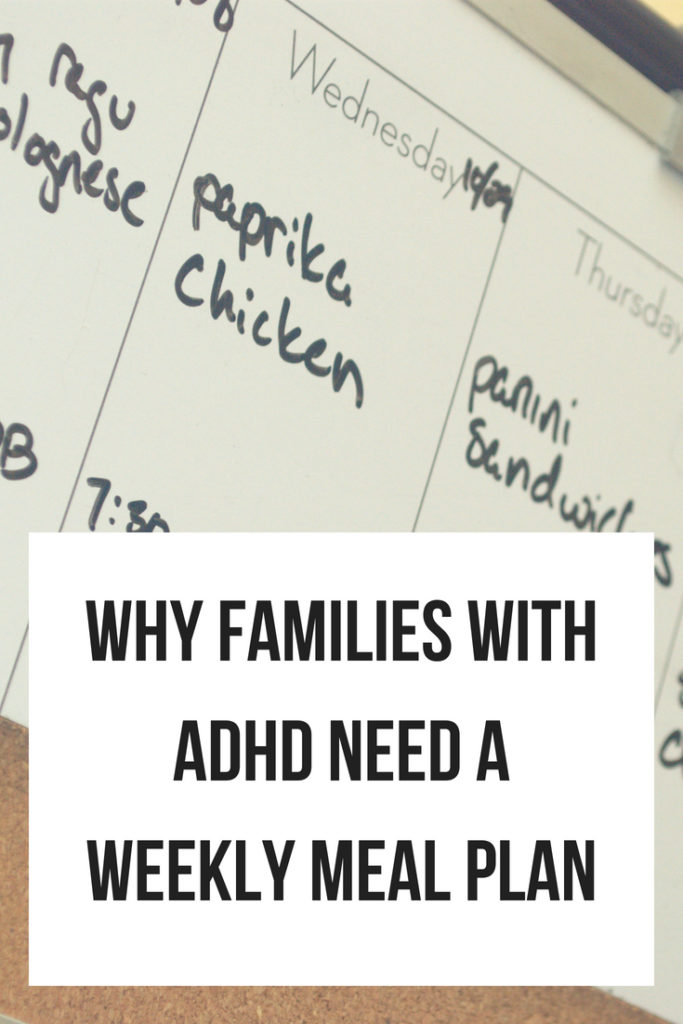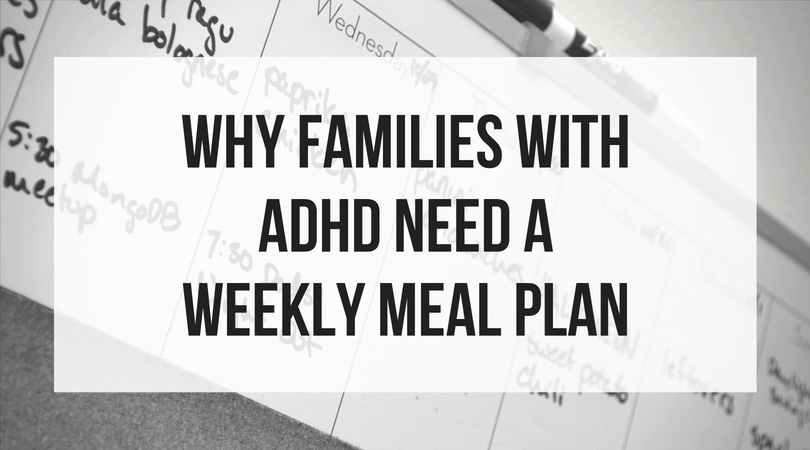Do you know what’s for dinner tonight? Meal planning can be a huge struggle for families with multi-generational ADHD.
 When you think about it, meal planning is a readymade disaster for people with ADHD. Our brains sabotage us at every turn. Most of us struggle to plan ahead for fun stuff, let alone something that feels like a chore. And then our craving for instant gratification leads us to impulse buys and unhealthy snacks.
When you think about it, meal planning is a readymade disaster for people with ADHD. Our brains sabotage us at every turn. Most of us struggle to plan ahead for fun stuff, let alone something that feels like a chore. And then our craving for instant gratification leads us to impulse buys and unhealthy snacks.
When we do get around to making a plan, we don’t always stick to it. An elaborate meal that sounded exciting at the time feels overwhelming at the end of a long day. We thought we’d make it to the Asian grocery on Tuesday, but it didn’t happen. Now we’re missing one critical ingredient for the dinner we had planned. A coworker invited us to happy hour on the way out of the office this afternoon. Life happened.
So we order takeout. We eat a bowl of cereal after getting home late. The groceries we bought for that ambitious meal plan go to waste. We stop planning ahead because it only leads to more wasted food. Why bother if we aren’t going to follow through with it anyway?
I’m here to tell you, meal planning is worth it. I’ve been making and following a weekly menu for years, and I don’t know how I’d live without it.
The price we pay for poor (or nonexistent) meal planning
While meal planning can feel like a hassle, we pay a price for winging it every night.
- We throw away food because it goes bad before we use it.
- We get into expensive and unhealthy habits: ordering takeout or stopping at a restaurant.
- The family gets into arguments about who was responsible for getting dinner on the table or stopping at the grocery store.
- We lose family time, especially if we have older children. Everyone fends for themselves and carries food to their own corner of the house to eat — or eats in front of the TV.
- We sacrifice good nutrition when we fail to plan a real dinner and end up eating a bowl of cereal or a tray of pizza bites — again.
- Our children fail to learn basic meal preparation skills. When they leave home at 18, they lack confidence to cook nutritious, affordable meals for themselves.
- We experience feelings of failure, stress, inadequacy, and overwhelm. Making dinner seems like such a basic responsibility — one our parents and grandparents managed without questioning it — and yet it feels out of reach.
The keys to successful meal planning
Meal planning requires more than writing a list of dinner ideas. For a menu you’ll actually follow throughout the week, remember the following:
- Account for real life. That means the weather forecast, kids’ extracurricular schedules, evening meetings, and big projects at work. Look at your schedule and choose meals (or leftover nights) that feel realistic for your energy level and available time.
- Track your tastes. Keep a running list of meals your family has loved. Write down preferences. While I’d never recommend catering too much to a picky eater, some accommodations are okay. For example, my husband has a hard time eating certain hot foods on hot days, so we eat a lot of hearty pasta salads in the summer. My son loves most food, but cilantro and parsley taste like soap to him. Everyone likes some foods better than others and it’s important for kids to learn not every dinner will be their favorite. At the same time, it’s not fair to disregard others’ preferences completely.
- Keep a public grocery list. We have a chalkboard in our kitchen for our running grocery list. Whenever someone notices we’re about to run out of something — or wants to request a special treat — they write it on the list. The entire household helps make the grocery list and I don’t have to run around checking supply levels on shopping day.
- Make it easy. Unless cooking is one of your favorite hobbies, you won’t sustain an ambitious meal plan. Plan big batches, leftover nights, and simple meals. If you want to cook something that takes more than 30-60 minutes, save it for a weekend. Let your family help choose meals for the week. Do whatever you can to make life easier while still eating a healthy diet. This will look different for everyone. Be creative. For me, it’s easier to use a bread machine than to pick out sandwich bread in the store. My dad puts dinner in the crock pot in the morning so he can put his feet up and not cook after work.
Bottom line: meal planning shouldn’t be hard.
With your meal plan, you’re investing in your family relationships, budget, and health. Don’t make it stressful — that defeats the point! Any work I do to plan our family’s weekly menu, I do to avoid more work or stress later. This is the only context in which I allow myself to use the word “lazy.” Creating less hassle and inconvenience for myself is always worth the effort.
Next time, I’ll post a step-by-step guide to creating a weekly meal plan. Most of the ADHD self-help literature out there is too general. Tips and tricks sound great until you try to implement them! I’ll actually get into the nitty-gritty of how I put my meal plan together every week.
Do you create a menu for the week? What are your biggest meal planning challenges? Please share in the comments.
Hey there! Are you enjoying The ADHD Homestead?
Here's the thing: I don't like ads. I don't want to sell your attention to an advertising service run by the world's biggest data mining company. I also value my integrity and my readers' trust above all, which means I accept very few sponsorships/partnerships.
So I'm asking for your support directly. For the cost of one cup of coffee, you can help keep this site unbiased and ad-free.
Below you will find two buttons. The first lets you join our crew of Patreon pals and pledge monthly support for my work. Patrons also have access to my Audioblogs podcast. The second takes you to a simple donation page to pledge one-time or recurring support for The ADHD Homestead, no frills, no strings. Do whichever feels best for you!

